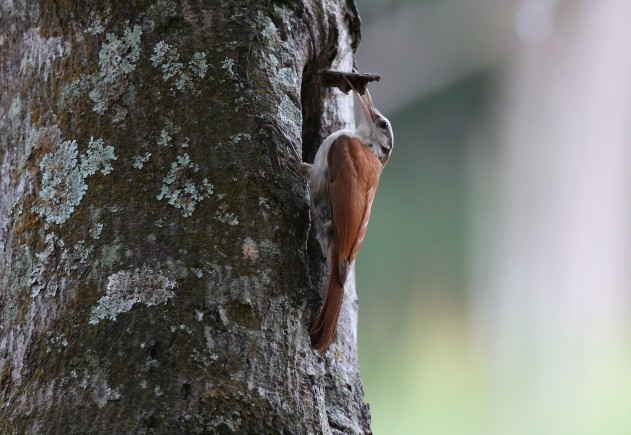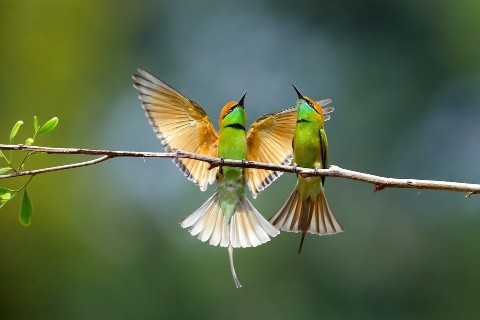We are not only priests, we are kings. Only after God created the sky, land, and sea (creation days 1-3a), then filled them with plants, lights, and animals (creation days 3b-6), did God create man. God then gave man ‘dominion’ over all the things that He had created (Gen. 1:26-28)—over the ‘birds of the air, the fish of the sea, the animals of the land, and over the earth itself’. The Hebrew words used in this passage translated ‘dominion’ and ‘subdue’ are words commonly used for kings. Psalm 8:4-8, understood by theologians to be an inspired commentary or elaboration on this passage, uses the word ‘crown’ (Psa. 8:5) and clarifies that that rule is over ‘all things’.
The New Testament commentary on this same passage, I Cor. 15:24-28, uses the words ‘kingdom’, ‘rule’, ‘authority’, and ‘reign’. God is certainly the One Who deserves to rule over the creation. After all, He is the Creator of all those things and the only One Who has absolute power over those things. Nonetheless, God chose man to be a ruler over the creation in His place.
God did not look at everything He had made and then determine which being would be most suited to be ruler. The “Let us make man…” statement in Genesis 1:26 indicates instead that He planned for humans to be rulers before He created them. This distinction is important because we are rulers according to divine appointment, not because of our ability. He designated us to be rulers then gave us the tools we would need to accomplish this task. We have no reason to boast of our role as rulers, for both the role and the abilities were given to us by God so that we can obey and glorify Him.
This also means that we fill the role of ruler even if we lack the ability (analogous to the case of a very young boy who becomes king over a country). Unfortunately, this also means that we must rule (we were made rulers—Gen.1:26—and we were commanded to rule—Gen. 1:28) and we must bear the responsibility of reigning, even if we turn out to be very poor rulers. The study of biology can help a Christian be a better ruler over the creation in at least three different ways.
Through Biology We Can be Better Shepherd Kings. So many rulers have so abused the authority given to them by God that many people cannot see kingship as something good. However, God’s standard of the ideal ruler is the shepherd king. God is described as the shepherd of Israel (e.g. Psa. 23:1; 80:1; Isa. 40:11), and Jesus calls Himself ‘the good shepherd’ (John 10:11-16). God commanded the rulers of Israel to rule as good shepherds over the flock of God (Ezekiel 34). Just as the shepherd is willing to lay down his life for his sheep, so the shepherd king is to promote his subjects over his own pleasure and desires. He is sensitive to, and meets the needs of, his subjects and at the same time is subject to God. The shepherd king serves both God and subjects. The shepherd king is one example of the servant leadership advocated throughout Scripture.


Consider that when people choose rulers, they tend to choose men who have somehow proved their power. The first king mentioned in the Bible, for example, was Nimrod (Gen. 10:10). The Bible describes him as ‘a mighty one on the earth’ (Gen. 10:8) and ‘a great and mighty hunter before the Lord’ (Gen. 10:9). Although people choose such ‘mighty men’ so that such a person will protect them, many of the same mighty men abuse their power for their own gain. Likewise, when Samuel was seeking to anoint a king over Israel, he thought he had found such a person in Eliab, the strong, first-born son of Jesse (I Sam. 16:6). However, God did not choose Him. God passed over the older, stronger-looking sons of Jesse and chose Jesse’s youngest son, the shepherd David. David had proven himself faithful to the care of his sheep and he had proven himself to have a heart for God (I Sam. 16:7).
We should follow the example of David as we rule over the creation of God. Rather than exploit, plunder, and abuse the creation for our own end, we should seek God with all our heart and serve the creation He created. We should rule over the creation as God would rule. One evidence of God’s concern for the creation is the Sabbath rest He required the Israelites to provide to their land (“For six years you shall sow your land and gather in its fruits, but the seventh year you shall let it rest and lie fallow, that the poor of the people may eat; and what they leave the beasts of the field may eat. You shall do likewise with your vineyard, and with your olive orchard.”: Exo. 23:10-11, and similarly in Lev. 25:2-7).

It is instructive to note that God did not assign us to be rulers without giving us the ability to rule. As God created humans, He gave humans the authority and power to rule. That we have the power can be seen in the incredible ways in which humans have directly altered the creation. That we have the authority can be seen in the massive impact our sin has had on the creation. When Satan fell, there was apparently no change in the physical creation. The fall of man was another matter entirely. According to Romans 8:18-20, the pain, suffering, bondage, and corruption to which the entire universe is subject is a consequence of man’s sin. God cursed His own creation because of man’s fall. Then the sin of man in the days of Noah brought about a global flood that destroyed all living things found on the land. Even when we think we are abdicating our responsibility to rule, we are still rulers. Our decisions—good or bad—substantially impact the creation.
In order to serve the creation most effectively we need to better understand it. If we do not know what plants need to thrive, or what critters need to stay healthy, or what the earth requires to best support the life on it, then we will do a poor job of caring for the creation. We will rule poorly even if we desperately wish to rule well. The more we understand the creation, the better we can serve it. The study of biology allows us to better understand the biological creation, and thus better rule over it. I pray that his text will encourage you to whole-heartedly serve God and rule over the biological creation more effectively.
Through Biology We Can be Better Stewards. As rulers over the creation, we are also called to be stewards. A steward in Scripture is placed in charge of someone else’s belongings (e.g. Gen. 44:2; I Chr. 28:1). Though he is not the owner, the steward is made ‘ruler’ over those things (Luke 12:42, 44). Since we do not own the creation that we rule over, we are stewards of that creation.
The steward over a household serves that household, paying employees (e.g. Mat. 20:8), providing for the needs of the people in the house (e.g. Luke 12:42), and taking care of visitors (e.g. Gen. 43:19, 24). The steward is given his responsibility for the purpose of serving others (I Pet. 4:10). A steward who abuses others or serves himself rather than others is specifically condemned (Luke 12:45). In both our roles—as shepherd kings and as stewards—we are expected to provide for the needs of the creation, serving the creation and not abusing it.

At the choice of the actual owner of the goods, stewards even enjoy the same kind of authority that the owner possesses. Biblical examples of stewards had the authority to buy and sell needed provisions (e.g. Gen. 44:1), the authority to capture thieves (Gen. 44:4-5) or release prisoners (e.g. Gen. 43:23), and the authority to renegotiate the debts of the owners (Luke 16:5-7). Likewise, God has granted us the authority over the creation to do with it as we like. At the same time, the steward was not to perform his own will, but the will of his master (Luke 12:45, 47). So likewise, we are to perform the will of God in the creation and not our own will. As in the case of our role as ruler, as stewards we are to oversee the creation as God would.
Finally, because the owner might ask for an accounting at any time, the biblical steward is to be ready at all times (Luke 12:43) to give an account of how well he has taken care of the owner’s possessions (I Cor. 4:1; e.g. Luke 16:1-2). Since Christ could return at any time, as stewards of His creation, we must always be ready to give an account of how well we have taken care of those things He made. Applying the stewardship principle to our role as rulers of the creation, we must realize that the authority we have over the creation is not something earned or even deserved but granted by God. So, it is something to be thankful for. We should care for the creation because it is not ours, but God’s. It was made for His pleasure and is His handiwork and we must treat it as important to God.
We should realize that someday we will have to give an account of everything that we did, including our role as rulers over His creation. Did we rule over it as we were supposed to? Did we care for it as if it were important to God? We are rulers whether we like it or not, and if we do not rule well, or if we refuse to rule at all, we are subject to judgment. The more we learn about God and the biological creation the more we learn about how to be a good steward of the biological creation.
I pray this course will better prepare you for the Lord’s return by helping you care for His creation more effectively. As this text introduces biological illustrations of God’s nature, the author will be reminding you of the stewardship responsibility we have towards the biological creation. I hope that through this, you will unite with others in the church in creating a more constructive perspective of creation stewardship than has been common in the past.

Through Biology We Can Enhance Creation’s Glorification of God. The parable of the talents in Matthew 25 introduces a concept too infrequently heeded by the church. In that parable (Mat. 25:14-30) the lord gave talents to three servants—or stewards. When the lord returned after a time he rewarded those who invested and increased their talents but condemned the servant who did not take a risk and merely preserved the talent he was given. It seems that the lord expected each servant not just to keep what he had, but also to take some risk and work hard to use the talent and multiply it. The lesson we get from this is that God desires for us to take those things which we have been given and increase or enhance them.
As rulers and stewards, we have been given charge of the creation. Applying the principle of increase or enhancement to our role as stewards and rulers, we are not just to preserve the creation, we are to take some risk and work hard to increase or enhance the creation. How do we do that? God created to bring glory to Himself, and it is the purpose of man to glorify God (I Cor. 10:31). Consequently, the creation is increased or enhanced when it brings God more glory. We glorify God as we fulfill our priestly responsibilities (i.e. as we recognize the illustrations of God’s nature in His creation, worship God as a result, and bring others into that worship). But we can increase the creation’s glorification of God if we can increase how much glory the creation actually brings to God.
The good ruler enhances the creation. He brings out more evidence of the nature of God so as to reveal more and more of the glory of God. At first thought this would seem impossible. God created the world to bring glory to Himself. Can man even think to make the world better than God created it? Actually, we can, if God created it in such a way that we could. And He did. God revealed many illustrations of His nature in the creation, but it seems that he hid even more. God glorified Himself in the creation but included in that same creation the potential for even more glory. And He gave humans the ability to reveal that hidden potential and thus increase or enhance the glory that creation brings to God.
This may be analogous to parents who wrap gifts for their children, enjoy their children’s excitement as they unwrap the presents, and revel in the thanks their children give them with the receipt of the gifts. It is as if God wrapped gifts of His glory for us to reveal, and God enjoys our excitement as we unwrap the gifts and He revels in the thanks we give Him for those gifts. Through biology we can discover the potential—the gifts of glory—God hid in the biological creation and find ways to reveal it. In our role as rulers, we can enhance the biological creation to the increased glory of God. As the text introduces more ways to enhance the attributes of God in the biological creation, I pray that you will learn how to glorify God more effectively.

